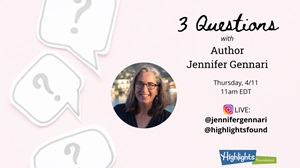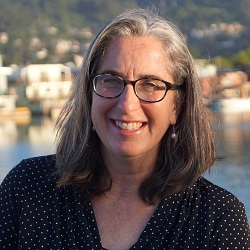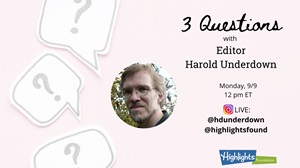Jennifer Gennari joined Highlights Foundation Social Media Manager Cat Galeano on Instagram Live to talk about getting organized and doing some planning before you start to write your novel.
Watch the conversation below. (Please note: closed captions are being added to the video below. When they are finished, you can see them by hovering over the bottom of the video and choosing the “CC” icon.)
Full Transcript:
Cat:
A big hello to our Highlights Foundation family. We’re so happy to have you here with us today. For those that may not know me, I’m Cat Galeano, my pronouns are she/her. I’m the social media manager at the Highlights Foundation, joining you from Westchester, New York on the traditional lands of the Seewanoy people. Apart from all the fun things I get to do at the Highlights Foundation, I am also a writer and a reader in my real live, who is very excited to welcome our friend and faculty Jennifer Gennari, who will be teaching the upcoming mini Before the Book: A Two-Night Mini to Get Organized and Get to the Heart of Your Story, taking place April 16th and 18th at 7:00 PM Eastern Time.
But before we dive in, I just wanted to remind our viewers that joining in on any Highlights Foundation sessions, to do so with no hate, no harm and no harassment of any kind.
Now, let’s get started. Yes, exactly. So Jen, my first question for you…uh, look, did you see that? Like hearts just popped up. That was cool. I haven’t seen that happen before!
My first question, speaking as a writer; confession I am not a plotter. I really, really wish I could be. It just doesn’t come naturally to me and even when I try, it’s really hard. So what would you, what would you say to someone who, like me, who wants to change in that area? Like, what do you think would be one of the biggest payoffs for putting in the work on the planning side of the process?
Jen:
Nice. So I, I get this all the time and I want to just define for people who are viewing who may not know. There are these terms that we bandy about: pantser and plotter, and when we talk about being a pantser, those are the people who say “oh I’m going to write from the seat of my pants. I’m not going to plan anything.” Which just sounds like, Cat, is like kind of what you like to do.
Cat:
Guilty!
Jen:
But, for me, I think I love details. I love organizing and making lists, and I really think there’s a continuum. I think that even people who say that they don’t plan are actually people who either think of the book a lot in their heads, or they have the characters and I’m thinking: why not write it down? So one of the things that I hope people get out of this process if you are not a natural planner is to kind of switch and think about it as like an interview. I came from a sporting background. So just interview your characters, but ask them these questions. Get to know them. Be curious and and we’re also going to interview your idea. You know like…yeah, you know, like should I run with this story idea? And so like it’s, it’s sort of like picking up a reporter’s mic and saying “hello story.” What, what, what, what would happen? What would be the worst thing that could happen? You know, all those kinds of questions that you, that might help you. So yeah, this is about being curious and what you, what you bring to that process will help you when you sit down to that blank page. I think you’ll be bursting with words and scenes and ideas and voice.
Cat:
Oh, I’m so excited. Just so people know, might not know, I’m actually monitoring that class, so I am very, very excited to be sitting live during it. I also used to be a reporter, so that is very exciting that, that concept of reporting your, reporting and, and interviewing your idea and your character. Oh, I cannot wait. I am so excited behind the scenes I want to be like whoo! Taking all my notes. So that is awesome.
Our second question is: when I read the description of this course, one of the things that makes me excited about it is that the many tools and techniques you’re going to cover, you are going to cover are really about playing with your idea and your story and getting to the heart of it and falling in love with it. Because the first person who has to love your story is really you, right? Without giving away all of those things is obviously we’re gonna go do a deep dive in the class and the mini, uh, is it possible for planning to be fun?
Jen:
And I think you already know the answer is yes, according to me. I like that you asked that question about loving your story idea and I, and I really want to emphasize that because yeah, it is so important. You have, you’ll be spending hours. Hours with the drafting, rewriting, revising–it all takes time and you have to believe in it. You have to really believe in that. You want to tell your story. That particular story, which is why I think poking at it…Um, OK. Have you ever made bread? I think a lot of people made sourdough bread especially.
Cat:
During the pandemic, yes.
Jen:
Yes. What are we doing with our story ideas like, it’s like this, the making bread: you’re going to kneed it. You’re going to roll it around. You’re gonna slice this it, you know, how you have to slice it open to check for holes? That’s what you wanna do. You wanna check for holes in your story idea even before you start writing. So I hope that helps a little bit.
I’m also a big fan of George Saunders, who’s a master…well, he’s a wonderful teacher and storyteller for adults. But he has like a, a lot of really great writing tips. And one of them is that the goal here is to love this story idea and to sit down and quote from him: “We can sit down to write. We have choice. We can sit down to write feeling happy, a little charged. up Looking forward to amusing or pleasing a reader.” And that is from George Saunders. And that’s my goal is that we think about the readers and that we want to amuse them or reach them or touch them. And so that’s part of that loving your story.
Cat:
I also think you gave me the best idea in the whole entire world, that might actually make me a planner now. You said something about the idea of, of imagining it sort of like bread. I think I’m just going to have a slice of toast when I’m going to plan as the incentive to actually get it done.
Jen:
Ohh. Jam or honey? I don’t know what you like.
Cat:
Oh my God. I just bought this like brand new passion fruit butter. Then I’m like. You know what, Jen? I think you just like flipped the switch for me, so hopefully join me. You know, with toasting that piece of bread and sitting down to plan your stories.
And so my third question for you is: What about the those of, those of us, not me, but everywhere else, who are, who are already planners and plotters? What do you hope they take away from this course?
Jen:
So yeah, there’s a… I, I have gathered over the years a lot of different ways writers organize their ideas and characters. I’m always so interested in like, oh. You do that? Oh, you do that? And so I’m going to share a lot of those. Some of them are on the computer, some of them are away from the computer. Ways to explore before writing, and I think even planners love to learn new ways to make lists and to experiment. And I’m a lifelong learner. Like if you come to this classroom like hey, did you think about this? I would love to hear that too. So I think it’s always fun.
Um, tied on to that, some people who are really new to writing and maybe thinking about writing their first children’s lit book. There, there are a lot of choices you have to make. And I think that a lot of people are scared of that. You know, that part of getting started writing the book is like making choices and and it’s fun to experiment to, so you know you’ve made “the right ones.” I can’t tell you. I’ve written books in first person and then gone back to third or third person and back to first. So this is point of view, the perspective. Past tense, present tense. What happens when in your story you know, like, where should your story begin? All of these things, I think are just a lot of hard decisions. And so I just think it’s great if you’re feeling alone in your writing, join us. You know join, oin me and Cat next week for Tuesday and Thursday. And we’re going to help you consider your options and like find that way into your story together.
Cat:
If that doesn’t convince you to join the fun, I don’t know what will, people. I think you have to come. We did actually receive a question in the box. Somebody asked a, a list of questions you could ask your characters. I think you’re going to have to come to the course for that one. Sorry, we can’t, we can’t reveal any any secrets here but you, you can absolutely register and join, join us next week. And of course, if you can’t make the live, you can always sign up anyway and you will receive the recordings that you will have over a month to rewatch.
Somebody also asked if kids..I mean, I’m not sure if your child is…I think this is more for adult writers. But your child can absolutely sit and watch with you. We can’t, we can’t tell you not to do that, but yeah. This is more for, for 18 and up, whoever’s the person writing.
Jen:
Yeah, I think that if if children are interested in getting stronger at their writing. I think that it depends on the age. They might find it interesting.
Cat:
Yeah, I mean, s loet us know. Let us know if your child joins. And how they, how they, what they learned. Well, that’s it for me. Jen, do you want to add anything else?
Jen:
No, I don’t think I, I have anything more to say except that I am inspired by reading and writing and I think that when you do anything with the Highlights Foundation. There’s such a love of joy of like, being responsible to write a story that, you know, brings hope to children and, and even if it faces hard stuff. And so I think it’s so important to, to think about writing with respect for, for, for our young readers out there. So that is my hope is that we will have a fun conversation. Well, it’ll be on, it’s a webinar, I should clarify that, but there will be lots and lots of opportunities to chat. And I know that Cat will be there for me to help you, make sure I don’t miss those comments. We’ll have lots of fun talking about making lists and, and interviewing your, your story idea and your characters.
Cat:
Yes. I wish truly I could monitor all the classes. Unfortunately I can’t, but this one I do get to monitor. So I’m very, very excited and if you’d like to learn more from Jen, please make sure to sign up for Before the Book: A Two-Night Mini to Get Organized and Get to the Heart of Your Story, taking place April 16th and 18th, which is already next week. So think about, think quickly if you’re going to join us at 7:00 PM Eastern Time. You can register on our website highlightsfoundation.org and lastly you can purchase Jen’s books at our virtual bookshop powered by bookshop.org. Thank you so much, Jen, for joining me today. We can’t wait to see you online and hopefully some of you too.
Jen:
Yeah. Thank you so much, Cat.
Cat:
Thank you, Jen. Bye.







